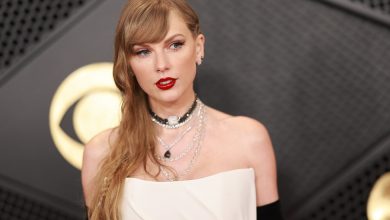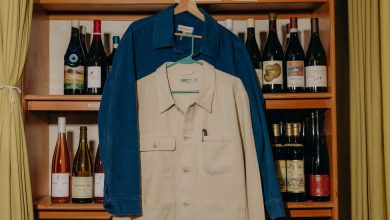Amiri Baraka’s ‘Blues People’ Comes Home to the Apollo

When he first read Amiri Baraka’s epochal study “Blues People: Negro Music in White America,” originally published in 1963, Russell Gunn felt that he already understood, on some level, the book’s urgent themes. That’s not just because “Blues People”— which centers the blues as the foundation of American music, and the lives of Black Americans as the foundation of the blues — has been widely influential, shaping public and institutional understanding of the history of the blues, jazz and American culture.
While growing up in East St. Louis in the 1970s and early ’80s, Gunn — the trumpeter, composer and bandleader — had always felt that truth already, in a way he links to ancestral memory.
“When the teacher would leave the classroom, all of us would beat rhythms on our desk,” Gunn recalled in a late January Zoom interview from his Atlanta home. “Somebody would rap, and then we’d take turns. This is what we did naturally, before we knew anything about New York, or people getting signed for their rapping. We’d never heard of a drum circle, never heard of a djembe or a griot.”
That experience exemplifies deeper aspects of the theories that Baraka, who died in 2014, first laid out in “Blues People”and then explored the rest of his life: that the music’s history is an ongoing community narrative of a people and their adaptation to and adoption of American life. It’s a story forged not just by African roots — work songs and church choirs, field calls and bebop, storied blues and jazz masters. Instead, it’s a history still being lived and written, wherever its people gather and make it.
The Apollo Theater stands singular among those gathering spots. On Saturday, Gunn and his genre-defying big band, the Royal Krunk Jazz Orkestra, will premiere his Baraka-inspired suite, “The Blues and Its People,” at the Harlem institution. A host of soloists and performers, many with deep connections to Baraka, will augment the 24-member band: the saxophonist and poet Oliver Lake, the singer Jazzmeia Horn, the trombonist Craig Harris, the Grammy-winning vibraphonist Stefon Harris, the poet Jessica Care Moore and the West African djembe player Weedie Braimah.
The suite is searching and soaring, alive with deep blues, church testifying and vigorous rump-shakers as it charts the path that Baraka laid out. Selections like “The Congo Square Root,” which kicks off with irresistible second-line drumming, and the boundary-crossing, dance-along closer “No Separation” make a party out of history.
“Baraka’s book starts with a call and response,” said Leatrice Ellzy, the Apollo’s senior director of programming, who commissioned the work. “In the tradition of Black folk, call-and-response and the drum beats throughout our entire being, in the rhythm of how we speak, in artistic pieces and on that Apollo stage.”
Dr. Fredara Hadley, an ethnomusicology professor at Juilliard, noted, “You can’t have call-and-response off by yourself.” When she teaches “Blues People,” a book she finds continually rewarding and challenging, Hadley emphasizes Black Americans’ “ongoing engagement with Africa and African music, generations after enslavement ends.”
“It’s asking, ‘What and where is home?’” she said. “The music’s part of the grass-roots exercises of creating one’s world, fashioning one’s self and making one’s self whole, all inside a community space. The music is the medicine.”
That echoes Baraka’s own call for “art for the sake of evolution” — as in art expressive of and directed to community — made from the Apollo stage as he introduced the consciousness-raising Last Poets collective in 1972.
Gunn called that stage “the mecca of what I represent as a musician.” He has blended jazz and hip-hop since the ’90s, notably on his Grammy-nominated “Ethnomusicology”album series. On its three albums and occasional live performances, the Atlanta-based RKJO performs with grit and power, a keen sense of jazz history, a searching cosmic-mindedness and pure funk with roots in Southern hip-hop.
Gunn credits Ronald Carter, his band director at East St. Louis Lincoln Senior High School, with showing him that despite clear harmonic and rhythmic differences, the music that they played in school was not fundamentally different from the music on the radio, or in his grandmother’s church. “It’s all part of the same continuum,” Gunn said. And he credits Branford Marsalis with reminding him, when Gunn played in Marsalis’s ’90s jazz-meets-hip-hop ensemble Buckshot LeFonque, how to play music “that’s serious, deep and meaningful” without being “pure self-indulgent [expletive].”
Gunn laughed recalling how some RKJO members have complained about how difficult his compositions can be to master. “This is high level music for sure,” he said, “but it’s still music, and it’s still for the people.”
That idea is at the heart of both Baraka’s book and Gunn’s suite. “What kind of music do you play?” asks Oliver Lake, in his poem “Separation,” now the centerpiece of the final movement of “The Blues and Its People.” Lake’s answer: “The good kind!” The poem is a blazing statement of how “labels” divide and separate, how “Aretha Franklin and Sun Ra are the same” and how Lake prefers “all my food on the same plate.”
“All of it is valid,” Lake said late last month in a spirited Zoom round table interview with musicians collaborating on the project. “All of it is equal, if you have it in your heart and are sincere what you present.” Baraka likewise addressed arguments over labels, noting in a discussion of the avant-garde movement in jazz in “Blues People,” “The controversy over whether this music is jazz or not seems foolish and academic, since the genre does not determine the quality of the expression.”
Lake has toured the world with his bands, including Trio 3 and the World Saxophone Quartet, but he radiates joy when speaking about what it means to play the Apollo: “There’s nothing like playing at home, in our community. In every hood in every major city of United States, we need to have our institutions in there and present.”
Stefon Harris, who will be performing on Saturday, added, “I feel very strongly in the work I do that I’ve got to put Black people’s stuff where Black people can get it.” Growing up in upstate New York, Harris studied classical music, though he said he never felt comfortable in its world. “‘Blues People’ has started me on a long journey home,” he said. “I’m supposed to utilize my own intellectual capital to understand and to empower and to uplift the stories of my own people.”
Harris now teaches at Rutgers and lives in Newark, a city still being shaped by the legacy of Baraka, who lived there much of his life — his son, Ras Baraka, is its mayor.
Craig Harris, the trombonist, often encourages young musicians to get a copy of “Blues People”— and a dictionary — to better understand “the continuum of deep African thought from beyond 500 years in this hemisphere, and how it goes all the way through us.”
He reminisced about the sense of open-door community at Baraka’s “black, red and green home” in Newark, not just the thinkers and artists who happened by — Nina Simone lived there for a time, saying that it reminded her of Africa — but the neighborhood kids shooting baskets while Baraka wrote, and the family’s deep connection to its neighborhood.
“We used to always talk about the ‘we within the me’ or the ‘me within the we,’” Harris said. “That was him to the core, and that’s the whole essence of ‘Blues People.’ It’s the way we talk, the way we walk. We never move by ourselves, we always move together.”



